Dr Debbie Sadd from the Faculty of Management, is travelling to Japan as a guest of the British Council as a keynote speaker at the Sharing experiences from London 2012 symposium in Tokyo on the 18th December (https://www.britishcouncil.jp/en/events/2020-games-university-symposium).
The Knowledge Partnership, based in London, approached selected UK universities to write case studies around the roles and opportunities they gained from London 2012 and in particular to share experiences and forge a deeper UK-Japan collaboration.
Debbie’s case study of BU’s opportunity to reform the learning environment and curriculum, raise our institution’s reputation, and build our brand image from on-going legacy projects was selected as one of the exemplars for the symposium. There will be over 80 Japanese Universities in attendance as well as members of the Japanese Organising Committee for the Olympic Games.
Debbie will report further once she has returned from her trip.
Category / Uncategorized
International Social Work – the rising star of the East
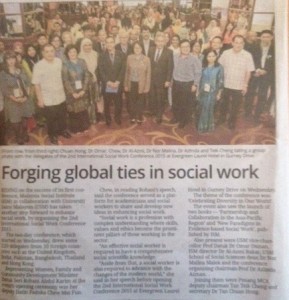 ‘International social work’ – this phrase to those who are interested in the profession and its developments, will either dilate eyes with lit up interest or will be scanned and dismissed as irrelevant to parochial concerns. In our experience it’s simply not a neutral subject, nor an uncontested one but is in fact replete with rich histories, cultural clashes as well as alliances; where grassroots initiatives and discourses engage a guerrilla warfare with dominant hegemonies; where neo-liberal colonialism competes for terrain and influence in poorer nations, wealthy in potential.
‘International social work’ – this phrase to those who are interested in the profession and its developments, will either dilate eyes with lit up interest or will be scanned and dismissed as irrelevant to parochial concerns. In our experience it’s simply not a neutral subject, nor an uncontested one but is in fact replete with rich histories, cultural clashes as well as alliances; where grassroots initiatives and discourses engage a guerrilla warfare with dominant hegemonies; where neo-liberal colonialism competes for terrain and influence in poorer nations, wealthy in potential.
These were some of the topics that were discussed both formally and informally at the 2nd International Social Work Conference 2015 held last week in Penang, Malaysia in collaboration with the Universiti Sains Malaysia (USM) and prestigious Institut Sosial Malaysia. The organising committee was led by under the organisational leadership of our good colleague, Associate Professor Dr Azlinda Azman, Chair of the Social Work Programme at USM.
In our formal affiliation as visiting professors and editorial board members at each institution respectively, we (Profs Sara Ashencaen Crabtree and Jonathan Parker) were extremely honoured to be invited to be plenary speakers at this excellent conference with the keynote delivered by Professor Dr Vimla Nadkarni, President of the International Association of Schools of Social Work. This was a star-studded event with an opening speech by Dato’ (Dame) Sri Rohani Abdul Karim, the Minister of the Ministry of Women, Family & Community Development in Malaysia. We were also able to catch up with the President of the Malaysian Association of Social Workers, Teoh Ai Hua, by now an old friend and colleague. We also met Dr Al-Azmi Bakar, Director of the Institut Sosial Malaysia. Sara even managed to catch up with her delightful, former student, Chan Soak Fong, now an elegant, professional woman and prominent social work wheel!
It was also an opportunity to reflect upon the shifting positions of power where Western social work is declining in global influence and the new star of social work rises in the East. Civilisations fade – and in the West we have had our day in the sun, which appropriately enough is setting in this direction. The social work models we developed and imported from Britain (along with those from the USA) during our heyday, have an honoured place in the new world order, but it is quite clear that vigorous pan-Asian paradigms are decentring Western models by taking centre stage in international social work. This trend unfortunately is particularly accelerated by an inward looking stance where the energies of social work in England and Wales seems heavily occupied in negotiating the radical shifts to the profession, which many would argue are jeopardising both its independence, its diverse remit as well as threatening to dilute its intellectual rigour. In the meantime schools of social work in the USA and Australia are jostling aggressively for influence in the Asian world in a neo-colonial push for power bartering their richer resources for a place at the Asian social work table.
It was therefore exciting and important to debate with Professor Nadkarni and other colleagues, these global trends, the opportunities and the threats. We discussed the rise of expertise in Asia, particularly but not specifically located in India, and where in countries like Malaysia social work is being rightly recognised as having great power and influence globally. Accordingly, Asian governments are beginning to recognise its huge potential to help transform national landscapes and therefore to bring international prestige to nations. This seemed symbolised by the media attention the conference commanded, where both the conference and its speakers appeared in all the major newspapers and on national television twice in two days. Sadly social work commands little public or political interest in the historical land of its birth, Britain especially in England, except to focus on deficits, failures and gleeful witch-hunts of hapless social workers caught in the crossfire.
We, in England, can learn much from the Asian experience, however, and the importance of accepting the wisdom of others whilst reigniting the grassroots activism from which much social work was original forged. It changes our position and perspective but perhaps in late modern society this is good for us, challenging us to think differently. For ourselves, our social research in Malaysia, and Southeast Asia as a whole, has opened up exciting vistas for us which we will explore and immerse ourselves in as we move forward into this new age and contest for authentic, impassioned social work, welfare and grassroots action
Sara Ashencaen Crabtree & Jonathan Parker
New joint AECC and FHSS publication

Congratulations to Joyce Miller, Monica Beharie and Elisabeth Simmenes based at the Anglo-European College of Chiropractic (AECC) and FHSS’s Alison Taylor and Sue Way who just had their paper ‘Parent reports of exclusive breastfeeding after attending a combined midwifery and chiropractic feeding clinic in the UK: A cross sectional service evaluation’ accepted in the journal Journal of Evidence-Based Complementary & Alternative Medicine.
Congratulations!
Prof. Edwin van Teijlingen
CMMPH
BU student quoted in The New York Times!
FHSS PhD student Rachel Arnold has been quoted in of one world’s most famous newspapers The New York Times. Late last week on Dec. 4th The New York Times published an article under the heading ‘Reported Gains in Afghan Maternal Health Are Found to Be Implausible’ [1]. Rachel Arnold was interviewed since her PhD study, based in CMMPH, focuses on maternity care in one of the larger hospitals in the Afghan capital Kabul. Rachel has also published an excellent paper from her research in Afghanistan in the scientific journal BJOG [2]. Her paper analyses the culture of a Kabul maternity hospital to understand its impact on the care of perinatal women and their babies. The paper is published in Gold Open Access, hence freely available to audiences across the globe,
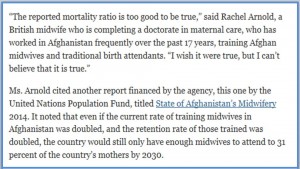
Congratulations.
Prof. Edwin van Teijlingen
Centre for Midwifery, Maternal & Perinatal Health
References:
- Nordland. R. ‘Reported Gains in Afghan Maternal Health Are Found to Be Implausible’ The New York Times Dec 4th, 2015, see: http://www.nytimes.com/2015/12/05/world/asia/afghanistan-maternal-mortality-rate.html
- Arnold R, van Teijlingen E, Ryan K, Holloway I. Understanding Afghan health care providers; a qualitative study of the culture of care in a Kabul maternity hospital. BJOG 2015: 122(2): 260–267.
FMC Research Seminar: ‘Communication Research’, Wed, 9 December, Room, W240, 3-5pm, Weymouth House
Communicating Research
FMC Cross-Departmental Seminar Series 2015-16
Time: Wednesday, 9th December, 3-5 pm
Venue: The Screening Room W240, Weymouth House, Talbot Campus.
3-4pm: A Politics and Media Research Centre event:
Dr Jen Birks. University of Nottingham
Adapting to dominant news narratives: tax ‘fairness’ as a Trojan horse for anti-austerity politics
Over the past five years the issue of tax avoidance has broken through into mainstream news media and public debate, after many years in which the campaigning efforts of NGOs, trade unions and a few investigative journalists were met largely with indifference. Protest group UK Uncut have been widely credited with increasing public engagement in the issue. News routines are less reliant on official and elite sources than in the past, and protesters less universally delegitimised in dominant news discourse, but the political claims of social movements still tend to be neglected or reduced to vague or naive opposition. UK Uncut were conscious of the common pitfalls and attempted to fit their own framing of the issue into existing news frames. In presenting a practical alternative to cuts, they hoped to substantiate an argument against the broadly accepted ‘necessity’ of public spending cuts, smuggling an oppositional claim inside a familiar narrative.
Their framing of the issue in terms of compromised political interests and ‘fairness to taxpayers’ fitted with dominant news narratives and was widely adopted by other sources, including the Public Accounts Committee, and by journalists, but generally in terms of individual and organisational wrongdoing and self-interest rather as a systemic critique. This did little to challenge or disrupt the overarching dominant narrative of fiscal crisis, necessary cuts, and even of fair tax as low tax. However, the playful performativity of the protests themselves – although part of an activist repertoire, risking distancing themselves from the mainstream – were successful in achieving some limited press coverage of the cuts that they claimed could be prevented by corporations paying their ‘fair share’, but those arguments were not picked up by other voices.
This paper analyses the extent to which this ‘adaptation’ approach to news framing (Rucht 2013) or intervention in dominant narratives (Hirschkop 1998) was successful in advancing political claims and objectives, and whether this case supports the contention that strategically performative and rhetorical interventions in the public sphere can compensate for marginality and lack of discursive power.
Jen Birks is an Assistant Professor in the department of Culture, Film and Media at the University of Nottingham, where she teaches political communication and public cultures. She is the author of News and Civil Society (Ashgate 2014).
4-5pm A Narrative Research Group Event
Wednesday 9 December, 4pm
In the second of two special sessions focusing on the international research of Bournemouth academics, Drs Richard Berger and Peri Bradley will be presenting research recently delivered at the 2015 Popular Culture Association Conference.
Richard Berger – Activating Kafka: the double-logic of an adaptation.
In 1962 Orson Welles’ adaptation of Franz Kafka’s novel, The Trial, was released to lukewarm reviews. However, right up until his death in 1985, Welles persisted in telling interviewers that The Trial was his greatest film. In 1993, Harold Pinter again adapted the work for film – this time more ‘faithfully’ – and Welles earlier version was drawn back into a critical sphere where it was re-appraised as the definitive Kafka on screen. Far from straying too widely from Kafka’s seminal novel, Orson Welles in fact had a profound understanding of the German-speaking Czech writer’s work, and the his dark nightmarish humour. From Citizen Kane to Chimes at Midnight, the ‘utterance’ of Kafka is visible across all of Welles’ work, which has served to further Kafka’s paratextual ‘afterlife’.
Peri Bradley – Camping Out With Lady Gaga: An Investigation of the Political Potential of Female Camp Performance.
This paper explores the under-researched area of female camp, its relationship to feminism, and its political possibilities for women specifically. Previous studies of Camp and Camp performativity have relied on issues of sensibility and minority positioning – such as Sontag and Isherwood – but here I hope to expand on this original concept to provide a more inclusive definition of Camp that investigates the notion of female Camp as part of a historical and archetypal tradition present in both US and UK media that brings Camp and Camp performance out from the cultural periphery and into the mainstream in a positive – rather than negative way.
*This session will be followed by a festive book launch celebrating a number of recent publications by NRG members. Drinks and nibbles will be served in DG68 from 5-7pm, all very welcome.
About the series
This new seminar series showcases current research across different disciplines and approaches within the Faculty of Media and Communication at BU. The research seminars include invited speakers in the fields of journalism, politics, narrative studies, media, communication and marketing studies. The aim is to celebrate the diversity of research across departments in the faculty and also generate dialogue and discussion between those areas of research.
Contributions include speakers on behalf of
The Centre for Politics and Media Research
The Centre for the Study of Journalism, Culture and Community
Narrative Research Group
Journalism Research Group
Advances in Media Management Research Group
Emerging Consumer Cultures Research Group
Public Relations Research Group
Bournemouth Academic invited to present at Developing Social Data Science Methodologies workshop within the Alan Turing Institute
Katarzyna Musial-Gabrys was invited to present her work on complex social networks during the upcoming workshop organised by the Alan Turing Institute within the Foundation of Social Data Science initiative.
The Alan Turing Institute was established in 2015 as the UK national institute for the data sciences in response to a letter from the Council for Science and Technology (CST) to the UK Prime Minister (7 June 2013), describing the “Age of Algorithms”. The letter presents a case that “The Government, working with the universities and industry, should create a National Centre to promote advanced research and translational work in algorithms and the application of data science.” (https://www.gov.uk/government/publications/the-age-of-algorithms).
Katarzyna’s presentation will contribute to shaping the portfolio of research challenges to be addressed within the Alan Turing Institute.
Title of Katarzyna’s talk: Methodological challenges in data aggregation in complex social networks.
Abstract of the talk:
For the first time in history, we have the possibility to process ‘big data’ (gathered in computer systems) about the interactions and activities of millions of individuals. It represents an increasingly important yet underutilized resource because due to the scale, complexity and dynamics, social networks extracted from this data are extremely difficult to analyse. There is no coherent and comprehensive methodological approach to analyse such networks which is crucial to advance our understanding of continuously changing people’s behaviour.
One of the methodological challenges is to cope with the variety of available big social data. This data comes from multiple systems (email, instant messengers, blogs, social networking sites, google searches, YouTube, etc.); in each system user can have one or more accounts; this data describes different types of activities (commenting, sharing, messaging, calling, etc.) and relationships (direct, quasi-direct and indirect). In order to be able to effectively process gathered data using data science approaches we need to develop new methodology that will focus on the multirelational (more than one type of connections in a network) character of data.
In general, there are two methods to do that: (i) analyse each relation type separately and then combine results from different layers or (ii) merge all relation types in one layer and analyse this newly created layer. Both approaches require effort in terms of redefining existing network analysis techniques. Analysing each network separately means that methods for combining results from different layers need to be developed. Merging some/all connection types into one heterogeneous relation means that a new approach for aggregation of data from different layers is required. Only by developing rigid approaches to data aggregation, the analytics task can be performed.
If you are interested and you would like to get some further information please contact kmusialgabrys@bournemouth.ac.uk.
Research Makes Sense for Undergraduate Students
“Relationship between teaching and research is amongst the most intellectually tangled, managerially complex and politically contentious issues in mass higher education system” (P.Scott 2005)
 I had the opportunity to organise a research dissemination event for our Digital Media Design Undergraduate students, opening the event to MA and PhD students. Different topics were presented with touching points of debates centred on “Arts design practice and politics of digital media. Dr. Veronica Barassi (Goldsmith), Paula Callus (BU) and Dr. Daniel Ploeger (Royal Central, School of Speech and Drama) were invited to present their research in front of undergraduate students, master and PhD students; as result a kaleidoscopic afternoon spent with our students, unfolded a common ground both in methodology and critical approach. Looking at media from cultural studies, anthropologic and artistic point of views was of great help to empower students’ willingness to create cultural links to their practice but also to feel part of an active and critic citizenship where a global culture is promoted continuously. I had the opportunity to organise a research dissemination event for our Digital Media Design Undergraduate students, opening the event to MA and PhD students. Different topics were presented with touching points of debates centred on “Arts design practice and politics of digital media. Dr. Veronica Barassi (Goldsmith), Paula Callus (BU) and Dr. Daniel Ploeger (Royal Central, School of Speech and Drama) were invited to present their research in front of undergraduate students, master and PhD students; as result a kaleidoscopic afternoon spent with our students, unfolded a common ground both in methodology and critical approach. Looking at media from cultural studies, anthropologic and artistic point of views was of great help to empower students’ willingness to create cultural links to their practice but also to feel part of an active and critic citizenship where a global culture is promoted continuously. |
We are all aware that research and teaching are often resolved into separate domains competing for time, resources and space.
On the other side embedding research into Undergraduate curriculum, shows greater involvement of the students, deeper understanding through inquiry-led learning.
A connection of research and teaching in academic work, makes university education distinctive and the potential to generate additional research output and new knowledge as well as the creation and strengthen pathways towards postgraduate research become incredibly natural (Giller 2011). Additionally I would mention the bidirectional sense of “gratitude” that derives from a learning experience when integrated into the culture of sharing knowledge.
Latest Major Funding Opportunities
The following funding opportunities have been announced. Please follow the links for more information:
AHRC
Arts and Humanities Research Council and BBC Radio 3 invite applications for the New Generation Thinkers of 2016 scheme. The scheme aims to support early career researchers to communicate their research findings to those outside the academic community through BBC broadcasting. The scheme allows reseracers an opportunity to develop their own programme for BBC Radio 3 and a chance to regularly appear on air. Applications are welcomed in all areas of arts and humanities and those in social sciences and medical science whose work intersects with arts and humanities.
Maximum award: Not specified. Closing date: 07/01/16.
British Academy
British Academy invites applications for its International Partnership and Mobility Scheme, which aims to support the development of partnerships between the UK and other areas of the world where research excellence could be strengthened by new, innovative initiatives and links. Any branch of the humanities or social sciences is eligible and the intended focus is on collaborative research of a mutual interest, rather than purely establishing networks.
Maximum award: £30,000. Closing date: 10/02/16.
Economic and Social Research Council
Economic and Social Research Council invites proposals for its Secondary Data Alaysis Initiative (SDAI), which aims to deliver high quality, high impact research through the deeper exploitation of major data resources created by ESRC and other agencies. Funding is available for up to 18 months. Proposals should address the following core principles: maximising the use of key ESRC-funded data resources; developing the capacity of early career researchers to undertake research using complex data resource; working collaboratively with non-academic stakeholders and ensuring that the accumulated learning and ongoing research impacts from previous phases and projects is captured.
Maximum award: £200,000. Closing date: No deadline.
Medical Research Council
Medical Research Council in partnership with the Department of Health’s National Institute for Health Research invites proposals for the Methodology Research programme. Proposals may address: Research methods in disciplines underpinning health research including biomedical, behavioural and social science, experimental and stratified medicine, rendomised trials, cohorts and other research designs investigating health, healthcare, health services and health policy; Methods for effective regulation (including indices for decision making), approval, adaptation and reporting of new interventions (including behavioural); Research methods for valid measures of health, e.g. health outcomes, exposure and risk (including behaviour, cognition and emotion) and wellbeing.
Maximum award: Not specified. Closing date: 21/06/16.
Natural Environment Research Council
Natural Environment Research Council and the Biotechnology and Biological Sciences Research Council invite applications for their Knowledge Exchange Fellowship in the area of aquaculture. The award will invest in a suitably qualified academic to broker links between academics and business within the UK aquaculture community and provide expert input and advice to the UK aquaculture network.
Maximum award: Not specified. Closing date: 17/03/16.
Natural Environment Research Council’s British Antarctic Survey Institute invites applications for its Polar Ship Research Opportunities, which support scientists who have secured funding and require access to work onboard polar research ships. The marine facilities planning service allows scientists to apply for access to marine equipment and ship-time and there are two types of applications: ship-time and equipment; marine equipment only.
Maximum award: Not specified. Closing date: No deadline.
Royal Society
Royal Society invites nominations for its Medals and Awards. Nominations can be made for excellent candidates from accross various disciplines and nominations for women, under-represented minorities and those undertaking research in industry are particularly encouraged, to increase diversity in awards. Please visit the award page for details of each award.
Maximum award: £10,000. Closing date: 01/02/16.
If you are interested in submitting to any of the above calls you must contact RKEO with adequate notice before the deadline.
Please note that some funding bodies specify a time for submission as well as a date. Please confirm this with your RKEO Funding Development Officer
You can set up your own personalised alerts on Research Professional. If you need help setting these up, just ask your School’s/Faculty’s Funding Development Officer in RKEO or view the recent blog post here.
If thinking of applying, why not add notification of your interest on Research Professional’s record of the bid so that BU colleagues can see your intention to bid and contact you to collaborate.
ESRC funded project: “Dementia Friendly Architecture – Reducing Spatial Disorientation in Dementia Care”
 New ESRC-funded project in Psychology and BUDI
New ESRC-funded project in Psychology and BUDI
This week saw the start of a two year ESRC-funded project entitled “Dementia Friendly Architecture: Reducing Spatial Disorientation in Dementia Care Homes”. The project, which has been awarded to Dr Jan Wiener (Psychology/BUDI), aims to develop design guidelines for dementia-friendly architecture that minimise spatial disorientation, one of the earliest signs of dementia.
Post-Doctoral researcher Dr Ramona Grzeschik, who started on the first of December, and Chris Hilton (PhD student) will test how different aspects of build environments affect orientation and navigation abilities in people with dementia. In order to do so, they will use cutting-edge virtual environments and eye-tracking technology (https://microsites.bournemouth.ac.uk/wayfinding/) which allows for systematic manipulations of environmental properties.
This international multidisciplinary project brings together researchers from cognitive psychology, dementia research and architecture. It is a collaboration between Bournemouth University’s Wayfinding Lab, BUDI (Bournemouth University Dementia Institute), Northumbria University (Prof Ruth Dalton, Co-I), UWS (Prof Anthea Innes, Co-I) and the German Centre for Neurodegenerative Diseases (Prof Wolbers, Prof Nestor, both project-partners).
Dr. Fiona Kelly invited guest speaker at Cecily Saunders Institute, King’s College London
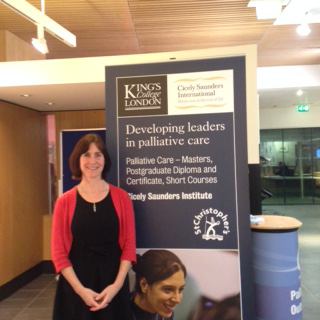 On 25th November, Dr Fiona Kelly attended the Cecily Saunders Institute at King’s College London as an invited guest speaker to present research on determining what aspects of the design of care environments might be important for people with dementia nearing the end of life. The key messages of her presentation were the importance of firstly assuming the ability of people with dementia to engage with the senses, whether through touch, sound, smell, sight or taste and then to provide the means of engaging with whatever sense was appropriate or possible. The presentation was followed by a panel discussion with the audience in which the practical application of design principles within hospital settings was debated. The consensus was that even small changes can make a big difference. Following the presentation and discussion, the panel made a commitment to include consideration of dementia design principles in staff education within the Institute.
On 25th November, Dr Fiona Kelly attended the Cecily Saunders Institute at King’s College London as an invited guest speaker to present research on determining what aspects of the design of care environments might be important for people with dementia nearing the end of life. The key messages of her presentation were the importance of firstly assuming the ability of people with dementia to engage with the senses, whether through touch, sound, smell, sight or taste and then to provide the means of engaging with whatever sense was appropriate or possible. The presentation was followed by a panel discussion with the audience in which the practical application of design principles within hospital settings was debated. The consensus was that even small changes can make a big difference. Following the presentation and discussion, the panel made a commitment to include consideration of dementia design principles in staff education within the Institute.
Fleming, R., Kelly, F. and Stillfried, G. (2015) ‘I want to feel at home’: establishing what aspects of environmental design are important to people with dementia nearing the end of life, BMC Palliative Care. http://www.biomedcentral.com/1472-684X/14/26
‘Psychosocial Studies Tackles Austerity’, 4 December,1-3pm, Birkbeck College, University of London
Panel Discussion:
‘Psychosocial Studies Tackles Austerity’
Friday 4 December 2015, 1-3pm
Room B04, Birkbeck Main Building, Torrington Square, London WC1E 7HX
You are invited to a seminar organised by the Association for Psychosocial Studies
A Panel Discussion, with Dr Lisa Baraitser (Birkbeck, University of London), Dr Tracey Jensen (University of East London) and Dr Chris Scanlon (University of East London).Each will offer a short provocation to the audience, followed by an open discussion. The event is chaired by Professor Candida Yates (Bournemouth University)
3.00-3.30pm: Tea and cake
Everyone is invited
Book your place here:
http://psychosocial-studies-tackles-austerity.eventbrite.co.uk
We look forward to seeing you there.
Best wishes,
The Association for Psychosocial Studies
admin@psychosocial-studies-association.org
Dr. Dinusha Mendis disseminates Government-funded research on the IP implications of 3D Printing at invited talks in UK and EU (Part II)
In April 2015, the UK Intellectual Property Office (UKIPO) published three reports reflecting a legal and empirical study into the intellectual property (IP) implications of 3D printing. The project – commissioned by the UKIPO – was awarded to Bournemouth University and was led by Dr. Dinusha Mendis.
Together with Dr. Mendis, the research team consisted of Dr. Davide Secchi (Southern University, Denmark; previously Bournemouth University at the time of conducting the research) and Dr. Phil Reeves (Econolyst Ltd – now Stratasys Strategic Consulting Ltd).
All three reports can be found here and further information about the project, including research findings and recommendations for the UK Government, Industry and Intermediaries can be found here.
Since the publication of the reports, Dr. Dinusha Mendis, Co-Director of the Centre for Intellectual Property Policy and Management (CIPPM) has been invited to deliver a number of talks in UK and Abroad, thereby reflecting the impact of the research.
This blog-post, highlights the invited talks in EU. For the dissemination of research in UK, please see here.
34th ECTA Conference, Hamburg, Germany
On 12 June 2015, Dr. Mendis was invited to present the research at the European Communities Trade Mark Association 34th Annual Conference in Hamburg. The Conference took place from 10-13 June 2015 and Dr. Mendis spoke on the copyright implications of 3D printing based on the findings from the UKIPO project.
Dr. Mendis spoke on the topic as part of a Panel exploring the challenges to copyright law, which also included Professor Ian Hargreaves, Professor of Digital Economy, Cardiff University UK and author of the Hargreaves Review 2011.
For further information, please see here.
MAPPING Project, First General Assembly, Hannover, Germany
From 22-23 September 2015, the First General Assembly of the FP7-funded MAPPING Project was held in Hannover, Germany at the Hannover Congress Centrum.
MAPPING – Managing Alternatives for Privacy, Property and Internet Governance brought together stakeholders from three key areas including Internet Governance, Privacy and Intellectual Property.
Dr. Mendis was invited to speak in the Intellectual Property Panel titled ‘The EU IP Reform: Unlocking Culture, Stimulating Progress’. As part of the talk, Dr. Mendis was invited to speak on the UKIPO 3D Printing project.
Further information about the event can be found here.
OHIM Enforcement Conference, Alicante Spain
In November (18-20 November 2015) Dr. Mendis was invited by the Office for Harmonisation in the Internal Market (OHIM) in Alicante Spain. The 3-day event organised by OHIM, Europol and Eurojust explored issues on tackling enforcement in relation to the infringement of copyright and design law.
The event was attended by policy makers, law makers, customs and border protection officials, investigators, criminal analysts and industry experts amongst others.
Dr. Mendis presented at this conference together with with Dr. Davide Secchi (co-author of Study 1 of the UKIPO Project) and member of the research team which carried out the Commissioned work for the UKIPO.
Dr. Mendis and Dr. Secchi presented the research carried out particularly for Study 1 of the UKIPO project, but also took the opportunity to speak on next steps and future projects – in taking forward the UKIPO Project.
In this regard, Dr. Mendis spoke briefly about the work being carried out for the newly funded project considering a legal and empirical case study on 3D printing, 3D scanning and mass customisation of ancient and modern jewellery.
For more information about the new project, please see here. For further information about OHIM’s event, please see here.
FORUM Institut Management GmbH, 3D Printing and IP, Munich, Germany
On 1 December 2015, FORUM Institüt fur Management GmbH hosted an international conference exploring 3D Printing and IP Rights. The conference brochure including further details and speakers can be found here.
Dr. Mendis was invited to speak on the UKIPO Project with a particular focus on the implications for IP as a result of 3D online platforms as well as its impact on the industrial sector.
The presenters were drawn from industry, professional practice and academia thereby providing for a vibrant discussion.
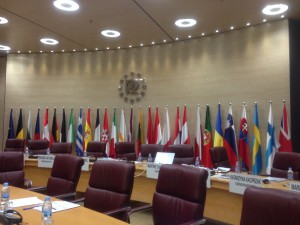
Academy of Marketing 3rd B2B Marketing Colloquium in Paris, 11-12 APRIL 2016: Opportunity to publish in Special Issue, Journal of Industrial Marketing Management (3* ABS ranking)
Dear All,
Université Paris 1 Panthéon Sorbonne in partnership with Bournemouth University is hosting 3rd annual colloquium for academics and professionals investigating the theory, context and practice of the B2B marketing.
Please see details on the theme, the indicative programme and submission instructions below. We are also pleased to inform that Professor Peter Laplaca is coming to facilitate the session aimed at helping you to write and publish in high quality journals. Moreover, the colloquium is sponsored by the Journal of Industrial Marketing Management (the lead ranking journal for the B2B marketing, 3* ABS ranking).
For any information related to the event and submission/registration process, do email Dr Elvira Bolat at ebolat@bournemouth.ac.uk and Dr Kaouther Kooli at kkooli@bournemouth.ac.uk
Theme: ADDRESSING THE BIG PICTURE: MACRO-ENVIRONMENT CHANGES AND B2B FIRMS
Organising team:
Université Paris 1 Panthéon Sorbonne
- Dr Héla Benmiled-Cherif, Maître de Conférences, Ecole de management de la Sorbonne, PRISM (porteur du projet) Hela.Benmiled@univ-paris1.fr
- Dr Guillaume Chanson, Maître de conférences en Stratégie, Ecole de management de la Sorbonne, PRISM Guillaume.Chanson@univ-paris1.fr
- Professeur Jean- François Lemoine, Directeur du Pôle Marketing, Professeur de Marketing, Ecole de management de la Sorbonne, PRISM, Jean-Francois.Lemoine@univ-paris1.fr
- Professeur Alexandre Steyer, Professeur de Marketing, Ecole de management de la Sorbonne, PRISM Alexandre.Steyer@univ-paris1.fr
- Professeur Catherine de la Robertie, Professeur de Stratégie, Ecole de management de la Sorbonne, PRISM Catherine.De-La-Robertie@univ-paris1.fr
- Professeur Jean-Jacques Pluchart, Professeur émérite de Stratégie, PRISM Jean- Jacques.Pluchart@univ-paris1.fr
Bournemouth University
- Dr Kaouther Kooli, Lecturer in marketing, Faculty of Management, Bournemouth University, kkooli@bournemoth.ac.uk
- Dr Elvira Bolat, Lecturer in marketing, Faculty of Management, Bournemouth University, ebolat@bournemouth.ac.uk
- Dr Julie Robson Senior Principal lecturer in marketing, Faculty of Management, Bournemouth University, Jrobson@bournemouth.ac.uk
- Dr Nektarios Tzempelikos, Tzempelikos , Senior lecturer in marketing, Anglia Ruskin University, Lord Ashcroft International Business School, nektarios.tzempelikos@anglia.ac.uk
To-date, B2B research has examined the factors that drive successful buyer/seller relational exchanges in business markets. However, the focus has mainly been on the supplier, the customer and/or the interaction between them, with little attention being paid to the impact of macro-factors on these interactions. The result is limited knowledge of the complexities that the broader macro-environment encompasses, how these affect the theory and practice of B2B marketing and how their management could be a source of differentiation for B2B firms. In other words, the ‘big picture’ of where and how B2B firms operate is still lacking.
Macro-environmental changes are both major and uncontrollable. They range from political and legal changes, to demographic and social conditions, as well as technological developments, natural disasters and civil wars. These factors influence firms’ decision making, their strategies, innovation, technological prowess, and market performances. . This need, to address the big picture of the impact of the macro environment on B2B firms, provides the topical basis for this Call for Papers.
Relevant topics for the Colloquium and special journal issue include (but are not limited to):
- Analysis of B2B relationships and firm responses to macro environmental changes.
- The management of macro-environment changes by B2B firms in the present and the future.
- The effects of political changes on B2B relationships g. the current discussions on Britain’s continued membership of the EU
- Legal changes, g., the growth of patent applications and issues of Intellectual property as indicators of firms’ R&D and innovation activities in a country or countries.
- Social and psychological effects of B2B activities with the business custom
- The impact of technological changes, g. how Social media is affecting B2B firms’ intelligence gathering and product marketing for their B2B
- How environmental factors affect (positively or/and negatively) relational exchanges in B2B m
- Value co-creation between firms and/or sub-contractors in similar or different industries
- Other topics affecting B2B firms, such us services marketing, customer relationship management, supply chain management and log
This colloquium is dedicated to researchers in B2B marketing. Day one will provide an opportunity for authors to present their papers and gain feedback from their B2B peers. On day two the keynote speaker will provide insight into how to get published in top B2B journals. Papers presented at this conference will be considered for publication in a special dedicated issue of Industrial Marketing Management.
Programme
Day 1
8.15-8.30 Welcome and refreshment
8.30-10.30 Parallel Session 1 Paper presentation ( 2 x 4 papers)
10.30- 10.45 Coffee break
10.45-13.00 Parallel Session 2 Paper presentation ( 2 x 4 papers) 13.00-14.00 Lunch
14.00-15.45 Parallel Session 3 Paper presentation ( 2 x 4 papers) 15.45-16.00 coffee break
16.00-17.30 Parallel Session 4 Paper presentation ( 2 x 4 papers)
19.00 Dinner
Day 2
7:30 – 8:00 Refreshment
8:00 12:00 Keynote Session: How to get published in a top B2B journal
Chair: Professor Peter Laplaca
12:00 – 12:15 Coffee break
12:15-14.00 Keynote Session: B2B research needs: Advancing the discipline & Close of Colloquium
Chair: Professor Peter Laplaca
14.00 Lunch
Deadlines
- 11th January 2016 : paper submission closes at midnight
- 25th January 2016 Paper decision notified to authors.
- 12th February 2016 Conference registration deadline for those presenting
Paper Format & Review
Full-length paper submission according to the guidelines of Industrial Marketing Management to B2Bcolloque@gmail.com
Manuscripts must be original, unpublished works not concurrently under review for publication at another outlet and are expected to follow the standard formatting guidelines for IMM (Guidelines can be found at https://www.elsevier.com/journals/industrial-marketing- management/0019-8501/guide-for-authors ). Do not submit a paper at the IMM paper submission website. Address questions regarding the special issue to any of the organising team.
The papers will undergo a rapid-response review process by end- January and must not be submitted to a journal prior or during this time. Success in the review will not guarantee publication in the special issue, but in order to be accepted for special issue publication, papers need to be presented at the colloquium.
Colloquium fees: Academics € 300 PhD students € 200
IMPORTANT
- For any cancellation after the 01 March 2016 there will be no refund of the fees
To register for the colloquium please go to http://b2b2016.sciencesconf.org
Open Access Highlights from BURO – December 2015
There has been a massive 269% increase in deposited files for journal articles in January to November 2015 compared with the same period in 2014.
The Mock REF will have accelerated this depositing but we hope that, with the HEFCE deadline of April 2016 fast approaching, researchers will upload their accepted files to BRIAN (for BURO) as soon as they receive the publisher’s email advising them of acceptance.
BU researchers-article deposits: 1 January- 30 November 2015
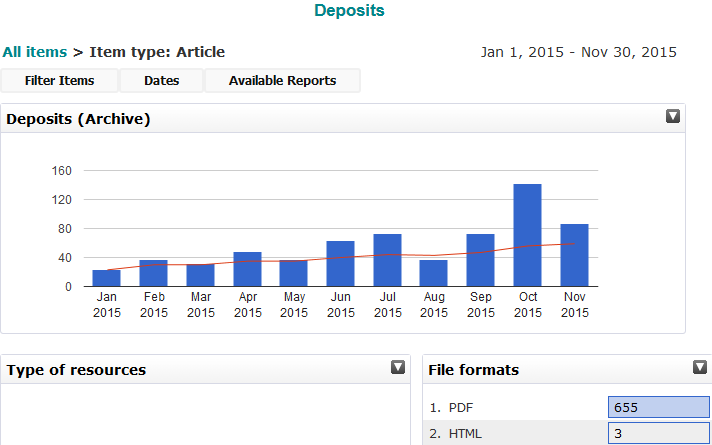
BU researchers-article deposits: 1 January- 30 November 2014
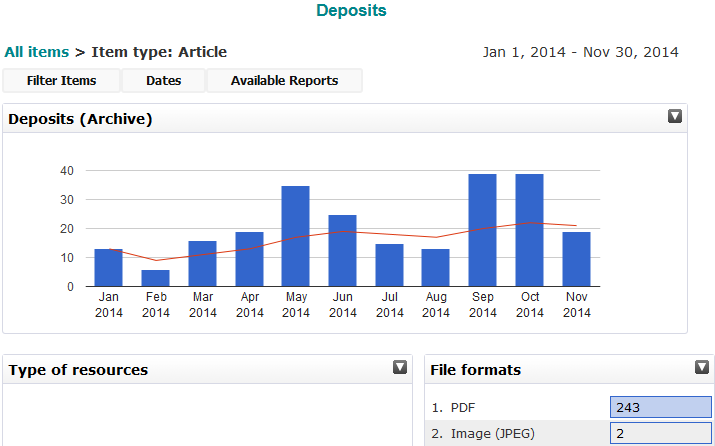
The Faculty of Science & Technology (SciTech) has been particularly good at uploading files. Witness the increase of 244% on same period last year.
SciTech researchers- all deposits: 1 January – 30 November 2015
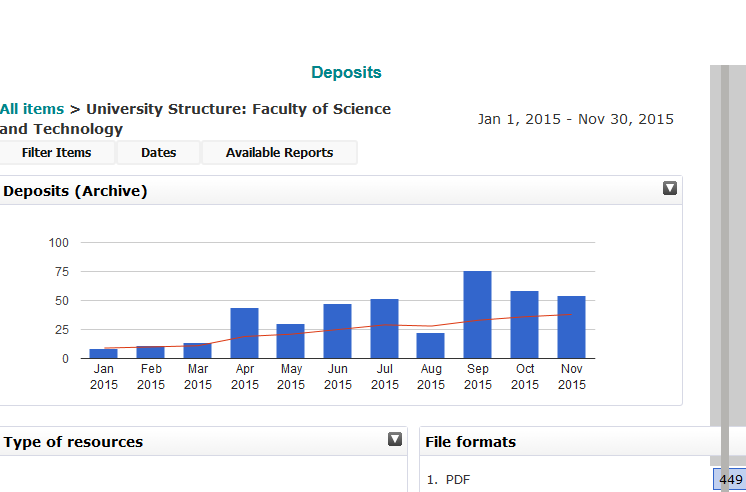
SciTech researchers- all deposits: 1 January – 30 November 2014
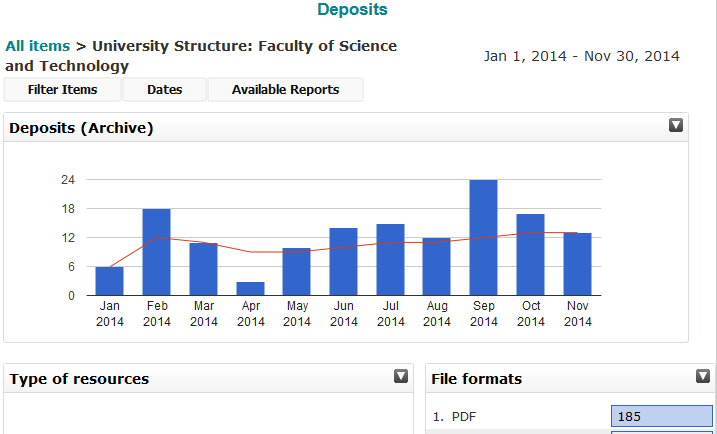
To be eligible for submission in the next REF, journal articles and conference proceedings (with ISSN) accepted for publication after 1 April 2016 must be made open access.
In practice, this means the outputs must be deposited in an institutional repository (BURO) or subject repository within a three-month period from the point of acceptance for publication.
Depositing your manuscript in BRIAN, as soon as it is accepted, ensures that it will be eligible for submission to the next REF. This may mean that manuscripts need to be put online before they are formally published. Items under publisher embargo in BURO are still REF compliant.
We need to maintain the momentum!
So REMEMBER
As soon as you receive the email informing you that your output has been accepted for publication, upload the file to BRIAN.
See our guide Open access and depositing your research
Any queries about depositing please contact the BURO team.
Bull run – archive research and lectures in Pamplona
Pamplona in the Spanish province of Navarra is renowned for the annual Running of the Bulls, popularised by Ernest Hemingway, and as being on the path of the Camino de Santiago. It is also home to the Universidad de Navarra whose Faculty of Communication has two strong links to BU.
Associate Professor John Oliver of the Faculty of Media & Communication (FMC) is one of the leaders of the European Media Management Association (EMMA) which is very active in Pamplona and includes the university’s President. Professor Tom Watson of FMC collaborates with public relations historian Dr Natalia Rodriguez-Salcedo, a regular participant in the International History of Public Relations Conference held each year at BU.
From November 23-27, Professor Watson visited the Pamplona university and spent time in its excellent archive researching the development of public relations education policies by European professional bodies from the 1950s to 1980.
“Dr Rodriguez-Salcedo has catalogued the records of pioneer Spanish practitioner, Joaquin Maestre Mora, who was very active in the International Public Relations Association (IPRA) from the 1960s to 1980s,” he said. ‘This links with BU’s own IPRA archive. My Spanish colleague investigated IPRA archive in 2014 and identified gaps in our files that could be filled from the Maestre archive.”
The investigations of both archives have led to journal articles and conference presentations by the two researchers, with another paper to come in 2016. “As archives are digitised, access to this basic material of communication history research will become easier but there is still nothing like leafing through paper files and finding the unexpected,” said Professor Watson.
While at the Universidad de Navarra, he gave guest lectures to UG and PG students on management of corporate communication, crisis management and the measurement and evaluation of public relations. Professor Watson also discussed current developments in research assessment with staff in the Faculty of Communication.
Cancelled talk by Anna Feigenbaum, 2nd December, R303, 1-1:50 pm
Unfortunately, this talk has been cancelled due to emergency. It will be rescheduled in the new year. Apologies for any inconvenience.
Please get in touch with Dr Mastoureh Fathi for further information. mfathi@bournemouth.ac.uk
Midwifery: A Revolutionary Practice?
This title was suggested by one of our collaborators Jeffery L Nicholas. Jeff is a scholar at Providence College in the USA who came to visit Bournemouth University recently. It is a great title, especially since many think about midwifery in terms of its long tradition. Some refer to midwifery as the ‘second oldest profession’. This blog post highlights some of the thinking generated through cross-national inter-disciplinary research.

Jeff (philosopher) and Edwin (medical sociologist) have been discussing the kind of political challenges midwives face today: struggles around the health of the mother and child, over costs (especially the underfunding of the NHS) and providers, and over the rights of women and families to choose. We both believe strongly that these struggles are inter-connected, and Jeff thinks a new approach is worthy of investigating for possible theoretical and practical aid in these struggles.
Specifically, Jeff looks at midwifery as a particular kind of practice with revolutionary potential. This question emerges from the work of Alasdair MacIntyre (1929—). MacIntyre condemns the bureaucratic society in which people become manipulators and manipulated. He also rejects large-scale, nation-state politics by which citizens might wrest control of their lives from those in charge. Rather, he focuses on the every day activities that comprise most of our lives. These activities—practices—come with their own ends that participants attempt to achieve, and they help teach individuals the virtues they need to act as agents in their lives, to participate in their communities, and to flourish. A strong community based around practices is one in which all can pursue the good life together, even if threatened by the state.
Having these discussions made us think about the substantive question, such as “Do some of the NHS free-standing midwife-led units, or some of the UK’s independent midwifery practices or The Farm Midwifery Center in Tennessee comprise such communities?” and “How can we best study this phenomenon?” Taking the discussion one of two steps further we brainstormed questions such as “How can midwifery education help an individual develop the virtues to live a flourishing life?” and “How does the student midwife learn to reason in her every day work?”
We hope these questions interest others, and that, together, we might pursue avenues of research to help us understand midwifery in the wider society, to support midwives and communities of midwives, to support human beings in their every day lives, and to birth a better world.
Prof. Jeffery L. Nicholas (Providence College)
&
Prof. Edwin van Teijlingen
CMMPH
Why not get involved in the British Science Festival 2016?
The call for event proposals and Award Lecture nominations for the British Science Festival 2016 are now open.
The British Science Festival is Europe’s longest-standing national event which connects people with scientists, engineers, technologists and social scientists. Tens of thousands of people come together to celebrate the latest developments in science and to engage in open discussion about issues that affect our culture and society.
Each September the British Science Festival transforms a different UK city into a vibrant celebration of science, engineering and technology.
The British Science Festival will be returning to Swansea University from 6-9 September 2016. The Festival is a national platform to showcase cutting-edge science, celebrate the latest scientific developments and engage in open discussion about issues that affect our culture and society.
The British Science Association needs your help to curate a vibrant programme of events. Proposals should be aimed at non-specialist adults with a broad interest in science. Find out how to submit an event and nominate an Award Lecture on the British Science Festival website here: http://www.britishscienceassociation.org/british-science-festival
Specifically, they are looking for original, high quality science entertainments events for a wide range of audiences, including families, children, young adults, special interest groups and followers of the arts.
- Previous kinds of events have included:
- Workshops for adults and for families.
- Comedy, drama and musical shows.
- Sci-art collaborations
- Trips to places of interest in the local area
- Behind the scenes tours
- Science shows
Anyone can propose an event – individuals, researchers, organisations or academic institutions from all over the UK. Events can be talks, debates or discussions for a public audience.
The call for proposals will close on 25 March 2016 and the deadline for Award Lecture nominations is 4 March 2016.
If you have any questions or want to discuss your ideas, please contact:
Rosie Waldron (Engagement Manager, British Science Association) T: +44 (0)20 7019 4941 E: rosie.waldron@britishscienceassociation.org
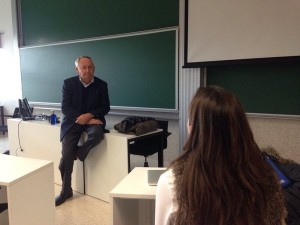











 Conversation article: London Marathon – how visually impaired people run
Conversation article: London Marathon – how visually impaired people run Horizon Europe News – December 2023
Horizon Europe News – December 2023